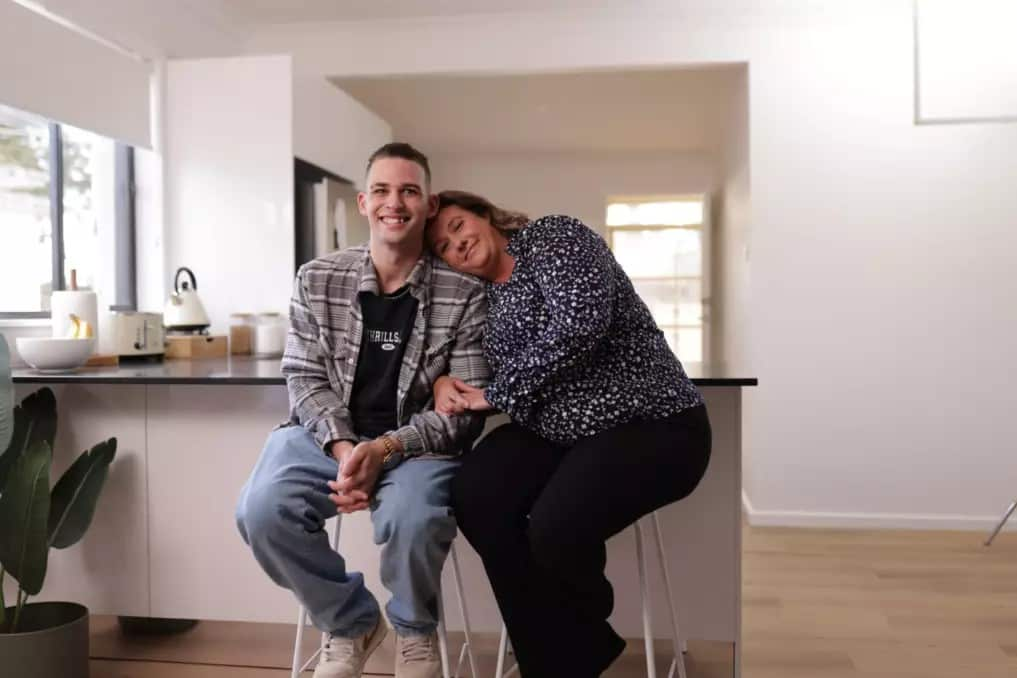Jacob Blackwell was once a fit tradie with a love of sports. But a devastating brush with meningococcal disease turned his life upside down.
He was used to feeling tired after work, but one Monday, he said he had "full chronic pain". At first, he thought it was the flu.
By Wednesday, he had lost consciousness and was rushed to hospital. When he woke up, the 23-year-old was told he had meningococcal disease and spent 230 days in hospital, where he had to relearn basic bodily functions — even blinking.
"Everything, I had to learn how to do again," Blackwell said. "Eating, talking, all that — it's back to square one."
"Think of it as an 18-month-old learning to do everything again," Blackwell said.
The diagnosis was just the beginning of a long road to recovery — both for Blackwell and his family.
His mother, Chelsea Blackwell, said when she found Jacob, he didn't look like himself.
"His brain had already been swollen, so his eyes were protruding and his skin was breaking a little bit. I initially thought he'd been assaulted," she said.
The diagnosis came as a shock.
"I never thought for a second [it was] bacterial meningitis. I never thought for a second that meningococcal had anything to do with this," she said.

What is meningococcal disease?
As Australia enters its peak season, experts are warning young adults and parents of young children to be aware of early symptoms of the disease.
The bacterial infection can strike without warning and accelerate rapidly, often causing death or leading to life-changing complications.
Even with treatment, up to one in 10 people may die, and one in three survivors may be left with long-term complications or a disability.
"That can be brain damage. It can be a loss of limbs. The list goes on," said general practitioner Dr Sam Hay. "These are life-altering effects ... leading to calls for early detection."
What are the signs of meningococcal disease?
"Early symptoms can look like the flu, including fever, headache, drowsiness and vomiting, which is why recognising the signs and acting quickly is so critical," Hay said.
"This is especially important as cases rise over winter.
"It often starts with a flu-like illness. A bit of a cold, a bit of a runny nose, a bit of a cough. But then it progresses with fevers and people become very, very sick after that."
He said people deteriorate within 24 to 48 hours. "It really can happen that fast," he said.
Chelsea said her son didn't show one of the most common symptoms of meningococcal — a rash with red and purple spots — but even so, it can be one of the last to appear.
"Unfortunately, if you see a rash, it's going to be too late," Hay warned.
The bacterium can spread through droplets from the nose and throat of an infected person.
It's not easily transmitted, usually requiring close, prolonged contact, such as living in the same household or kissing.
Australia enters peak meningococcal season
Like the flu, meningococcal disease is seasonal, with cases typically peaking in winter and early spring.
Already this year, 56 cases of meningococcal infection have been reported across Australia.
That includes 18 in NSW, 14 in Queensland, 10 in Victoria, seven in Western Australia, five in South Australia, and two in Tasmania.
Karen Quick, CEO of Meningitis Centre Australia, said understanding the signs and symptoms of the disease is crucial.
"Infectious disease experts tell us that every 20 minutes, your child will continue to get worse. If they continue to get worse, you'll know that something's not right," she said.
"What we're finding is parents don't know what the signs and symptoms are.
"It camouflages itself as a virus."
All children aged 12 months receive the vaccinations for the A, W, Y and C strains of meningococcal, under the National Immunisation Program (NIP).
While only Aboriginal and Torres Strait Islander children under two years old and people at increased risk due to specific medical conditions are eligible for a free B vaccine under the NIP. South Australia, Queensland, and the Northern Territory have state-funded vaccination programs to protect more children and teenagers against the B strain.
"Early detection can make a massive difference. Aussie parents need to understand that it can start with a cold or a flu, but it can rapidly progress," Hay said.
"If your kids are getting very sick very quickly, that's when you need to seek help as soon as possible."
As Blackwell readjusts to his new life, he's taking each day as it comes.
"As hard as it has been, I kind of like to take every day as my glass half full.
"I used to do sport, work, driving — things we take for granted that get taken away from you.
"You kind of adapt to the life you live now."
For the latest from SBS News, download our app and subscribe to our newsletter.

